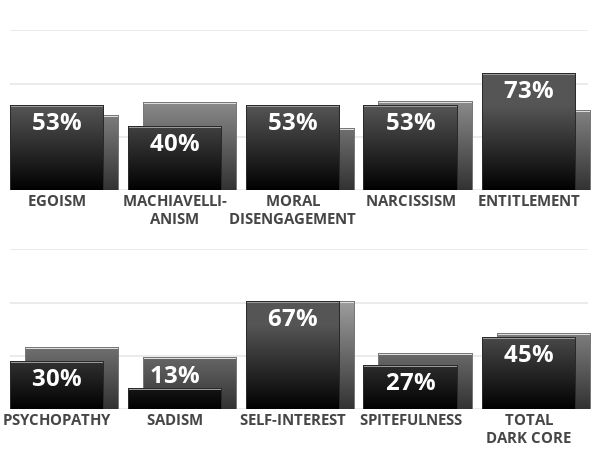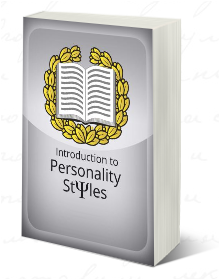Dark Core Personality Test
You are here because one of your friends linked you to their Dark Core Personality result:
Take the TestYour friend's results:

This makes your friend 1.89% Lighter than the average person.
Take the TestExplanation of Traits:
Egoism: “Excessive concern with one’s own pleasure or advantage at the expense of community well-being.” (Weigel et al. 1999)
Machiavellianism: “Manipulativeness, callous affect, and a strategic, calculating orientation.” (Jones & Paulhus 2014)
Moral Disengagement: “A generalized cognitive orientation that differentiates one’s thinking towards unethical behavior.” (Moore et al. 2012)
Narcissism: “An all-consuming drive towards ego-reinforcement and an egotistical interest in, or admiration of, one’s self.” (Jones & Paulhus 2014; Smith 2017)
Entitlement: “A stable and pervasive sense that one deserves and is entitled to more than others.” (Campbell et al. 2004)
Psychopathy: “Deficits in affect and self-control (i.e. callousness and impulsivity), as well as a lack of remorse, antisocial behavior, and volatility.” (Jones & Paulhus 2014; Smith 2017)
Sadism: “A tendency to humiliate others via cruel or demeaning behavior, or the propensity to intentionally inflict physical, sexual, or psychological pain on others in order to assert power or for pleasure and enjoyment.” (O’Meara et al. 2011)
Self-Interest: “The unprincipled pursuit of gains in socially valued domains, such as material goods, social status, recognition, achievement, and success.” (Gerbasi & Prentice 2013)
Spitefulness: “A tendency to engage in behavior that would harm others but would also entail harm to oneself.” (Marcus et al. 2014)
Total Dark Core: Your total Dark Core factor. Higher scores indicate a darker personality.
References
The Dark Core Personality Test was constructed on the basis of the following works:
- Gerbasi, M. E., & Prentice, D. A. (2013): The Self- and Other-Interest Inventory. Journal of Personality and Social Psychology, 105(3).
- Jones, D. N., & Paulhus, D. L. (2013): Introducing the Short Dark Triad (SD3). Assessment, 21(1).
- Marcus, D. K., Zeigler-Hill, V., Mercer, S. H., & Norris, A. L. (2014): The psychology of spite and the measurement of spitefulness. Psychological Assessment, 26(2).
- Moore, C., Detert, J. R., Klebe Trevino, L., Baker, V. L., & Mayer, D. M. (2012): Why Employees Do Bad Things: Moral Disengagement And Unethical Organizational Behavior. Personnel Psychology, 65(1).
- Moshagen, M., Hilbig, B. E., & Zettler, I. (2018): The dark core of personality. Psychological Review.
- O’Meara, A., Davies, J., & Hammond, S. (2011): The psychometric properties and utility of the Short Sadistic Impulse Scale (SSIS). Psychological Assessment, 23(2).
- Smith, R. (2017): The CT-DT3 Dark Triad Test IDRlabs.
- W. Keith Campbell, Angelica M. Bonacci, Jeremy Shelton, Julie J. Exline & Brad J. Bushman (2004): Psychological Entitlement: Interpersonal Consequences and Validation of a Self-Report Measure. Journal of Personality Assessment, 83:1.
- Weigel, R. H., Hessing, D. J., & Elffers, H. (1999): Egoism: Concept, measurement and implications for deviance. Psychology, Crime & Law, 5(4).
GET THE FULL STORY
Manual of Personality Styles
WHAT YOU GET
71-page manual, explaining the make-up of all personality styles, their hidden drives, and the theory behind the system.
Presented in an easy-to-read style and backed up by solid academic references.
14-day, no-questions-asked, money-back guarantee.
Order Now